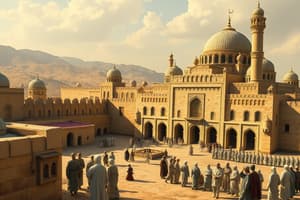Podcast
Questions and Answers
What caused the fragmentation of the Abbasid Caliphate?
What caused the fragmentation of the Abbasid Caliphate?
Emergence of new Islamic political entities and dominance of Turkic peoples.
What role did the Mamluks play in Egypt?
What role did the Mamluks play in Egypt?
- Soldiers and bureaucrats for Arabs (correct)
- Merchants facilitating trade (correct)
- Judges in Sharia law
- Educators in Islamic traditions
The Seljuk Turks were more tolerant of other religions compared to the Abbasids.
The Seljuk Turks were more tolerant of other religions compared to the Abbasids.
False (B)
The __________ Sultanate was established in India by 1206.
The __________ Sultanate was established in India by 1206.
What factors contributed to the military expansion of Islam between 1200-1450?
What factors contributed to the military expansion of Islam between 1200-1450?
Who were the Ulama?
Who were the Ulama?
What approach did Sufis use to promote the conversion to Islam?
What approach did Sufis use to promote the conversion to Islam?
Flashcards are hidden until you start studying
Study Notes
The Rise of Islamic States
- The Abbasid Caliphate fragmented, giving rise to new Islamic political entities dominated by Turkic peoples.
Egyptian Mamluks
- Mamluks were enslaved Turks from Central Asia, serving as soldiers and bureaucrats for Arabs.
- They seized control of Egypt from 1250 to 1517, playing a crucial role in its economic growth through facilitating trade in cotton and sugar.
- The Mamluks also played a pivotal role in preventing the expansion of the Mongol Empire into Africa.
Seljuk Turks
- The Seljuk Turks, another group of Muslim Turks from Central Asia, conquered parts of the Middle East.
- They established a sultanate, diminishing the role of the Islamic Caliph.
- The Seljuk Turks were less tolerant of other religions than the Abbasids, imposing restrictions on Christian travel, contributing to the Crusades.
Delhi Sultanate
- The Delhi Sultanate was established in India by 1206, marking the beginning of a period of Muslim rule that lasted until 1526.
- It was ruled by five dynasties and faced challenges in converting the Indian population, leading to a blend of Islamic and Hindu traditions.
- The Delhi Sultanate's influence was marked by the coexistence of diverse religious practices.
Military Expansion and Islam's Spread
- While early Islamic expansion wasn't primarily focused on religion, it became increasingly intertwined with military expansion after the decline of the Abbasid Caliphate.
- Turkic warriors from Central Asia were instrumental in establishing this new wave of Islamic states.
Merchants and Trade
- Merchants held a high societal status in Islamic societies, as exemplified by the Prophet Muhammad himself.
- Caravans carrying soldiers, pilgrims, merchants, and scholars facilitated trade and cultural exchange along crucial trade routes, leading to the development of merchant communities.
Missionaries
- The Ulama, scholars trained in Islamic law, played important roles in society, serving as judges, interpreters, administrators, prayer leaders, and teachers.
- They were entrusted with the responsibility of disseminating core Islamic teachings.
Sufis
- Sufis were instrumental in converting people in sub-Saharan Africa, as well as South and Southeast Asia. They facilitated the acceptance of Islam by integrating it with existing religious traditions, making it more appealing to local populations.
Studying That Suits You
Use AI to generate personalized quizzes and flashcards to suit your learning preferences.




